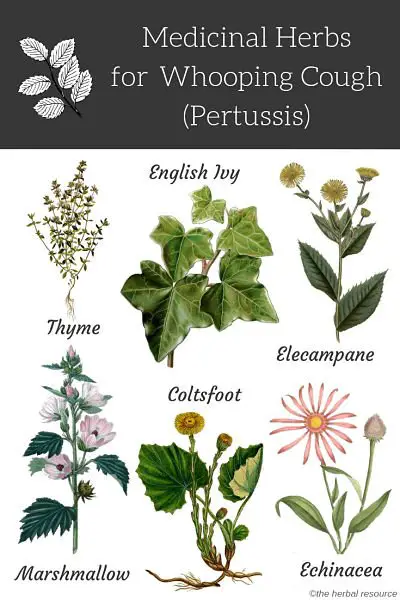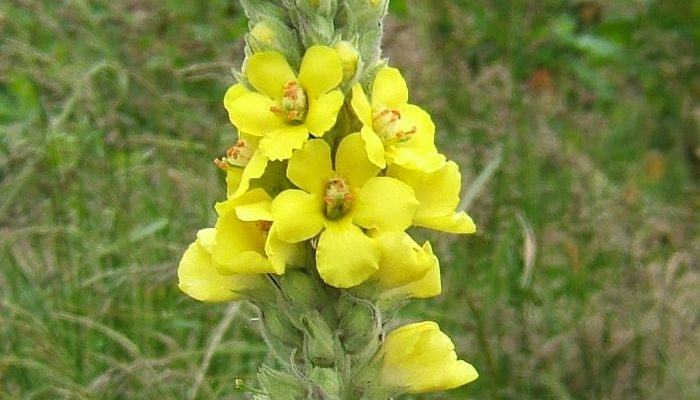The use of medicinal herbs as herbal remedies to treat whooping cough also known as pertussis focus on reducing the main cause which is respiratory tract infection.
Other uses of herbs for whooping cough are to liquefy and aid in expectoration of the tenacious mucus, help with the spasmodic nature of a cough by relaxing the airways and strengthen the respiratory tract mucous membrane.
Whooping cough is a bacterial infection within the body that is caused by a microorganism named bordetella. It is very contagious and should be treated as such. It causes coughing, sneezing, large amounts of mucous production and vomiting.
If whooping cough is contracted it has usually six-week to run its course. A common cough is the first sign, followed by bouts of coughing (whoops). Then leading to sessions of intense vomiting.
While being a great discomfort, the disease will naturally run its course and after the intense stages will resolve within about 2 or 3 weeks.
Antibiotics such as erythromycin may be prescribed by a doctor, but it is usually only partially helpful if whooping cough is caught very early on.
Studies show that there is nothing that has any tried and true ability to cure, or speed up the process in which whooping cough must run.
The use of herbal remedies for whooping cough can only be helpful in easing the symptoms and their severity.

Herbs for Whooping Cough Treatment
Thyme
Thyme (Thymus vulgaris) is a very commonly used herb in many different ailments. Its use as a natural remedy for whooping cough is based on its antibiotic, antiseptic, and expectorant properties found in its high content of volatile oil.
Care should be taken when using this herb as it has hypotensive properties which make it a mild sedative. (1)
Echinacea
It is suggested that echinacea (Echinacea angustifolia, Echinacea purpurea) is a good natural herb for whooping cough because it eases the severity of the symptom and may shorten the length of the typical 6-week cycle of whooping cough. (2)
It is one of the most popular herbal supplement on the market today and most commonly used herb in America.
It can be found on the shelves of almost any health store around the world.
Echinacea is usually available in capsules form and the therapeutic dose is 500 to 1,000 milligrams up to 3 times daily.
Elecampane
Used for a large variety of common illnesses, elecampane (Inula helenium) is suited as a natural herb for pertussis due to its ability to inhibit phlegm production, a major symptom of whooping cough.
This herb has long been used by herbalists to treat coughs specifically associated with whooping cough. (3)
Marshmallow
Used as a natural herb for whooping cough, marshmallow (Althea Officinalis) helps the body to expel extra fluid such as mucus; soothing cough as well as rid of the excess mucus build-up caused by whooping cough.
It overall is a great use for its ability to soothe many of the symptoms as well as act as an antibiotic for pertussis. (4)
Coltsfoot
Coltsfoot (Tussilago farfara) has been used as a natural herb for whooping cough as well as asthma and bronchitis due to its expectorant properties and its use as a demulcent. (5)
The genus name Tussilago means “cough dispeller”. The name “tussilago” is derived from the Latin “tussis”, meaning cough, and ago, meaning to expel.
Only short-term use of this as an herbal remedy for pertussis is recommended due to its level of pyrrolizidine alkaloids.
English Ivy
The primary purpose of English ivy (Hedera helix) is as a sedative effect which can reduce the number of attacks.
English ivy has been approved by the German Commission E as a treatment for respiratory catarrhs and chronic bronchial symptoms. (6)
Licorice
Licorice (Glycyrrhiza glabra) is a soothing, flavorful herb, and seems to have an anti-tussive effect that suppresses coughing.
Licorice may cause complications for people with high blood pressure, and should be used with caution. (7)
Wild Cherry Seeds
Wild cherry seeds (Prunus serotina), like English ivy, has a sedative effect.
The herb has a calming effect on the respiratory system and helps to ease the pressure and strain associated with a serious cough like whooping cough. (8)

Great Mullein
Great Mullein (Verbascum thapus) is a great herbal remedy for whooping cough as it has so far shown to have no known toxicity.
Great mullein is very widely used as a natural herb for pertussis as it is proven to help ease cough and many respiratory disorders.
It is an expectorant great for mucous membranes and glands, as well as the lungs. Studies show this to be used as an ideal antibiotic and anti-inflammatory. (9)
Other Natural Herbs That Have Been Used for Whooping Cough
- Red Clover – (Trifolium pratense)
- Usnea Lichen – (Usnea spp. – in the Lichenes or Lichen family)
- Garlic – (Allium sativum)
- White Horehound – (Marrubium vulgare)
- Hyssop – (Hyssopus officinalis)
- Anise – (Pimpinella anisum)
- Chamomile – (Matricaria recutita)
- Jamaican Dogwood – (Piscidia erythrina)
- Grindelia – (Grindelia camporum)
- Indian Tobacco – (Lobelia inflata)
- Sweet Basil – (Ocimum basilicum)
- Pipsissewa – (Chimaphila umbellata)
- Asafetida – (Ferula assa-foetida)
- Senega Root – (Polygala senega)
- Greater Celandine – (Chelidonium majus)
Supporting References
- Assessment report on Thymus vulgaris L., vulgaris zygis L., herba. Committee on Herbal Medicinal Products (HMPC). 12 November 2013 EMA/HMPC/342334/2013.
- Basch, Ethan & Ulbricht, Catherine & Basch, Samuel & Dalton, Sean & Ernst, Edzard & Foppa, Ivo & Szapary, Philippe & Tiffany, Natasha & Williams Orlando, Carolyn & Vora, Mamta. (2005). An Evidence-Based Systematic Review of Echinacea ( E. angustifolia DC, E. pallida, E. purpurea ) by the Natural Standard Research Collaboration. Journal of herbal pharmacotherapy. 5. 57-88. 10.1300/J157v05n02_06.
- Diguta, Camelia & Cornea, Calina Petruta & Ioniţă, L & Brînduşe, E & Farcaş, N & Bobit, D & Radoi) Matei, Florentina. (2014). Studies on antimicrobial activity of Inula helenium L Romanian cultivar. Romanian Biotechnological Letters. 19. 9699-9704.
- Fink, Careen & Schmidt, Mathias & Kraft, Karin. (2018). Marshmallow Root Extract for the Treatment of Irritative Cough: Two Surveys on Users’ View on Effectiveness and Tolerability. Complementary medicine research. 25. 10.1159/000489560.
- Wu, Qi-Zhen & Zhao, Dong-Xia & Xiang, Juan & Zhang, Mian & Zhang, Chao-Feng & Xu, Xiang-Hong. (2015). Antitussive, expectorant, and anti-inflammatory activities of four caffeoylquinic acids isolated from Tussilago farfara. Pharmaceutical biology. 54. 1-8. 10.3109/13880209.2015.1075048.
- Holzinger, F., & Chenot, J. F. (2011). A systematic review of clinical trials assessing the effectiveness of ivy leaf (Hedera helix) for acute upper respiratory tract infections. Evidence-based complementary and alternative medicine : eCAM, 2011, 382789. doi:10.1155/2011/382789.
- Shah, S. L., Wahid, F., Khan, N., Farooq, U., Shah, A. J., Tareen, S., … Khan, T. (2018). Inhibitory Effects of Glycyrrhiza glabra and Its Major Constituent Glycyrrhizin on Inflammation-Associated Corneal Neovascularization. Evidence-based complementary and alternative medicine : eCAM, 2018, 8438101. doi:10.1155/2018/8438101.
- García-Aguilar, Leticia & Rojas-Molina, Alejandra & Ibarra Alvarado, César & Rojas-Molina, I & Vázquez-Landaverde, Pedro & Luna-Vazquez, Francisco & Zavala, Miguel. (2015). Nutritional Value and Volatile Compounds of Black Cherry (Prunus serotina) Seeds. Molecules (Basel, Switzerland). 20. 3479-95. 10.3390/molecules20023479.
- Turker, Arzu & Ekrem, Gurel. (2005). Common mullein (Verbascum thapsus L.): recent advances in research. Phytotherapy research : PTR. 19. 733-9. 10.1002/ptr.1653.
Thordur Sturluson
Latest posts by Thordur Sturluson (see all)
- What is the Difference Between Hemp and Marijuana? - June 3, 2019
Don’t forget Chestnut tree leaves or bark made into a tea.